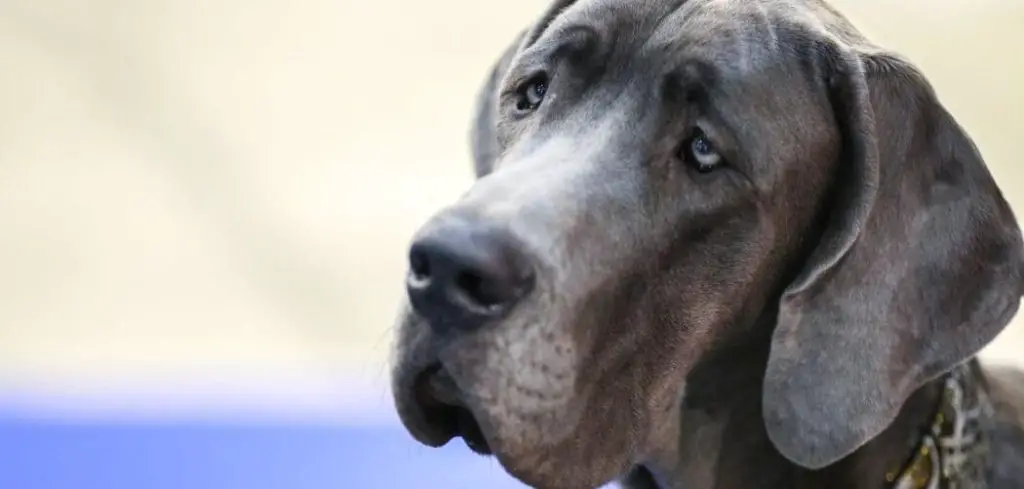When an old dog is not eating and peeing in the house, it often indicates more than a simple behavioral issue.
Appetite loss combined with changes in urination patterns can signal illness, discomfort, or cognitive decline.
We outline the common reasons why an old dog may not be eating and peeing in the house, what you can do, and when to seek veterinary help.
Old Dog Not Eating and Peeing in the House — Why It Happens
An old dog not eating and peeing in the house usually points to underlying medical or cognitive issues. Common causes include urinary tract infections, kidney or bladder disease, diabetes, cognitive dysfunction, or pain that affects mobility.
In older dogs, these changes are more serious because dehydration, malnutrition, and urinary complications can develop quickly.

Old Dog Not Eating and Peeing in the House: Common Causes
Urinary Tract Infection (UTI)
UTIs can make urination painful, leading dogs to avoid going outside and occasionally urinate indoors.
Pain and discomfort from infection can also reduce appetite. Dogs may strain while peeing, have blood in urine, or lick the urinary area excessively.
Left untreated, UTIs can ascend to the kidneys, causing severe illness and systemic complications, especially in seniors.
Read more: Old dog not eating and pooping blood (Here’s Why)
Kidney Disease
Kidney dysfunction in older dogs affects both appetite and urination patterns.
Dogs may drink more initially, urinate more frequently, or later become incontinent as kidney failure progresses. Appetite loss, vomiting, and lethargy often accompany these changes.
Early detection and veterinary management are critical to slow progression and maintain quality of life.
Diabetes
Diabetes can increase thirst and urination while reducing appetite in older dogs.
Accidents in the house may occur due to frequent urination or sudden urgency. Other signs include weight loss, excessive drinking, and lethargy.
Proper diagnosis, diet management, and insulin therapy are essential to stabilize blood sugar levels and prevent complications.
Cognitive Dysfunction (Dog Dementia)
Cognitive decline can cause disorientation, forgetting housetraining, and changes in appetite.
Older dogs may urinate indoors simply because they are confused or forgetful. They may also become less interested in food, sleep more, or appear anxious.
Cognitive support, routine schedules, and a stress-free environment can help manage symptoms, though medical evaluation is important to rule out other causes.
Pain or Mobility Issues
Arthritis, hip dysplasia, or injuries can make it difficult for older dogs to reach the yard in time.
Pain may reduce appetite, as moving to the food bowl or standing to eat becomes uncomfortable. Dogs may also associate discomfort with drinking or eating.
Addressing pain with veterinary-approved treatments or mobility aids can restore comfort, encourage eating, and reduce accidents.
Bladder Stones or Tumors
Bladder stones or tumors can cause urgency, discomfort, and urination accidents.
Older dogs may avoid eating due to pain or nausea caused by underlying conditions. Signs include straining to urinate, blood in urine, and frequent attempts to go outside.
Veterinary evaluation is critical, as surgical or medical intervention may be needed to prevent complications.
What to Do If Your Old Dog Is Not Eating and Peeing in the House
Ensure your dog has easy access to the bathroom, with frequent trips outside or indoors to a safe spot.
Offer soft, easily digestible meals and ensure hydration, particularly if urinary issues are present.
Maintain a consistent routine and monitor appetite, urination patterns, and behavior closely. Avoid scolding, as accidents are often involuntary.
Provide comfort and reduce stress by giving supportive bedding, elevated food and water bowls, and mobility aids if needed.
When to Call or Visit Your Vet
Consult your veterinarian if your dog refuses food and shows changes in urination.
Immediate care is required if you notice:
Blood in urine
Straining or painful urination
Lethargy or sudden weight loss
Persistent vomiting or diarrhea
Early veterinary intervention can identify infections, organ dysfunction, diabetes, or other serious conditions, preventing further complications.
Read more: Old Dog Not Eating (Causes and what to do)
Key Takeaway
When an old dog is not eating and peeing in the house, it often indicates underlying medical or cognitive issues.
Supportive care includes easy access to the bathroom, soft and palatable food, hydration, and a comfortable environment. However, persistent changes always require veterinary evaluation. Prompt diagnosis and treatment help maintain comfort, prevent complications, and improve quality of life for senior dogs.
